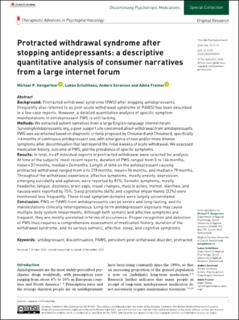Please use this identifier to cite or link to this item:
https://doi.org/10.21256/zhaw-21156Full metadata record
| DC Field | Value | Language |
|---|---|---|
| dc.contributor.author | Hengartner, Michael Pascal | - |
| dc.contributor.author | Schulthess, Lukas | - |
| dc.contributor.author | Sorensen, Anders | - |
| dc.contributor.author | Framer, Adele | - |
| dc.date.accessioned | 2021-01-06T15:59:22Z | - |
| dc.date.available | 2021-01-06T15:59:22Z | - |
| dc.date.issued | 2020 | - |
| dc.identifier.issn | 2045-1253 | de_CH |
| dc.identifier.issn | 2045-1261 | de_CH |
| dc.identifier.uri | https://digitalcollection.zhaw.ch/handle/11475/21156 | - |
| dc.description.abstract | Background: Protracted withdrawal syndrome (PWS) after stopping antidepressants (frequently also referred to as post-acute withdrawal syndrome or PAWS) has been described in a few case reports. However, a detailed quantitative analysis of specific symptom manifestations in antidepressant PWS is still lacking. Methods: We extracted patient narratives from a large English-language internet forum SurvivingAntidepressants.org, a peer support site concerned about withdrawal from antidepressants. PWS was ascertained based on diagnostic criteria proposed by Chouinard and Chouinard, specifically ⩾6 months of continuous antidepressant use, with emergence of new and/or more intense symptoms after discontinuation that last beyond the initial 6 weeks of acute withdrawal. We assessed medication history, outcome of PWS, and the prevalence of specific symptoms. Results: In total, n = 69 individual reports of protracted withdrawal were selected for analysis. At time of the subjects’ most recent reports, duration of PWS ranged from 5 to 166 months, mean = 37 months, median = 26 months. Length of time on the antidepressant causing protracted withdrawal ranged from 6 to 278 months, mean = 96 months, and median = 79 months. Throughout the withdrawal experience, affective symptoms, mostly anxiety, depression, emerging suicidality and agitation, were reported by 81%. Somatic symptoms, mostly headache, fatigue, dizziness, brain zaps, visual changes, muscle aches, tremor, diarrhea, and nausea were reported by 75%. Sleep problems (44%) and cognitive impairments (32%) were mentioned less frequently. These broad symptom domains were largely uncorrelated. Conclusion: PWS or PAWS from antidepressants can be severe and long-lasting, and its manifestations clinically heterogeneous. Long-term antidepressant exposure may cause multiple body system impairments. Although both somatic and affective symptoms are frequent, they are mostly unrelated in terms of occurrence. Proper recognition and detection of PWS thus requires a comprehensive assessment of medication history, duration of the withdrawal syndrome, and its various somatic, affective, sleep, and cognitive symptoms. | de_CH |
| dc.language.iso | en | de_CH |
| dc.publisher | Sage | de_CH |
| dc.relation.ispartof | Therapeutic Advances in Psychopharmacology | de_CH |
| dc.rights | http://creativecommons.org/licenses/by-nc/4.0/ | de_CH |
| dc.subject | Antidepressant | de_CH |
| dc.subject | Discontinuation | de_CH |
| dc.subject | PAWS | de_CH |
| dc.subject | Persistent post-withdrawal disorder | de_CH |
| dc.subject | Protracted | de_CH |
| dc.subject.ddc | 616.8: Neurologie und Krankheiten des Nervensystems | de_CH |
| dc.title | Protracted withdrawal syndrome after stopping antidepressants : a descriptive quantitative analysis of consumer narratives from a large internet forum | de_CH |
| dc.type | Beitrag in wissenschaftlicher Zeitschrift | de_CH |
| dcterms.type | Text | de_CH |
| zhaw.departement | Angewandte Psychologie | de_CH |
| zhaw.organisationalunit | Psychologisches Institut (PI) | de_CH |
| dc.identifier.doi | 10.1177/2045125320980573 | de_CH |
| dc.identifier.doi | 10.21256/zhaw-21156 | - |
| zhaw.funding.eu | No | de_CH |
| zhaw.originated.zhaw | Yes | de_CH |
| zhaw.pages.end | 13 | de_CH |
| zhaw.pages.start | 1 | de_CH |
| zhaw.publication.status | publishedVersion | de_CH |
| zhaw.volume | 10 | de_CH |
| zhaw.publication.review | Peer review (Publikation) | de_CH |
| zhaw.webfeed | Klinische Psychologie | de_CH |
| zhaw.funding.zhaw | Post-akutes Entzugssyndrom von Antidepressiva | de_CH |
| zhaw.author.additional | No | de_CH |
| zhaw.display.portrait | Yes | de_CH |
| Appears in collections: | Publikationen Angewandte Psychologie | |
Files in This Item:
| File | Description | Size | Format | |
|---|---|---|---|---|
| 2020_Hengartner-etal_Protracted-withdrawal-syndrome-antidepressants.pdf | 449.33 kB | Adobe PDF |  View/Open |
Show simple item record
Hengartner, M. P., Schulthess, L., Sorensen, A., & Framer, A. (2020). Protracted withdrawal syndrome after stopping antidepressants : a descriptive quantitative analysis of consumer narratives from a large internet forum. Therapeutic Advances in Psychopharmacology, 10, 1–13. https://doi.org/10.1177/2045125320980573
Hengartner, M.P. et al. (2020) ‘Protracted withdrawal syndrome after stopping antidepressants : a descriptive quantitative analysis of consumer narratives from a large internet forum’, Therapeutic Advances in Psychopharmacology, 10, pp. 1–13. Available at: https://doi.org/10.1177/2045125320980573.
M. P. Hengartner, L. Schulthess, A. Sorensen, and A. Framer, “Protracted withdrawal syndrome after stopping antidepressants : a descriptive quantitative analysis of consumer narratives from a large internet forum,” Therapeutic Advances in Psychopharmacology, vol. 10, pp. 1–13, 2020, doi: 10.1177/2045125320980573.
HENGARTNER, Michael Pascal, Lukas SCHULTHESS, Anders SORENSEN und Adele FRAMER, 2020. Protracted withdrawal syndrome after stopping antidepressants : a descriptive quantitative analysis of consumer narratives from a large internet forum. Therapeutic Advances in Psychopharmacology. 2020. Bd. 10, S. 1–13. DOI 10.1177/2045125320980573
Hengartner, Michael Pascal, Lukas Schulthess, Anders Sorensen, and Adele Framer. 2020. “Protracted Withdrawal Syndrome after Stopping Antidepressants : A Descriptive Quantitative Analysis of Consumer Narratives from a Large Internet Forum.” Therapeutic Advances in Psychopharmacology 10: 1–13. https://doi.org/10.1177/2045125320980573.
Hengartner, Michael Pascal, et al. “Protracted Withdrawal Syndrome after Stopping Antidepressants : A Descriptive Quantitative Analysis of Consumer Narratives from a Large Internet Forum.” Therapeutic Advances in Psychopharmacology, vol. 10, 2020, pp. 1–13, https://doi.org/10.1177/2045125320980573.
Items in DSpace are protected by copyright, with all rights reserved, unless otherwise indicated.